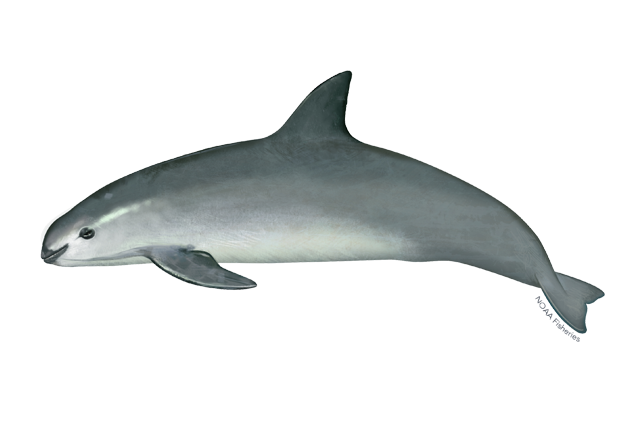Update on the Vaquita
On June 14, 2023, the U.S. Court of International Trade approved the voluntary dismissal of a case brought by a group of environmental organizations to force the U.S. government to take action to force Mexico to better implement steps to protect the grievously endangered vaquita. Prior posts on related legal efforts in this matter are here and here. The vaquita is a small porpoise that is endemic to Mexican waters in the Gulf of California. Unfortunately, its range overlaps with totoaba, which is subject to illegal fishing because the totoaba's swim bladder is prized in China for its apocryphal effectiveness in traditional medicine. As a result of illegal totoaba gill net fishing, there are 10 to 13 vaquitas remaining in the world. Unless there are dramatic changes in the bycatch of vaquita, the vaquita is will likely become extinct.
The decision is not legally very important because the parties reached a settlement and there was no need for the Court to make important findings of facts or law. The decision is, however, an important report on the perilous status of the vaquitas and on American efforts to pressure Mexico to act.
This case involved the Pelly Amendment to the Fishermen's Protective Act of 1967 and the Convention on International Trade in Endangered Species of Wild Fauna and Flora ("CITES") as legal levelers the plaintiffs asked the United States employ to protect the vaquita. Under CITES, the vaquita (Phocoena sinus) is an Appendix I animal, meaning it is among the most threatened of species. The Pelly Amendment requires that the Secretary of the Interior certify to the President that a foreign country is engaging in trade in a manner that diminishes the effectiveness of any "international program for endangered or threatened species. CITES is clearly such a program.
In 2014, the Center for Biological Diversity sent a letter to the Secretary of the Interior asking that the Secretary make that certification with respect to the vaquita. The Secretary never responded and the plaintiffs filed suit in the Court of International Trade.
Subsequently, the United States took some actions to pressure Mexico on this issue. For example, the United States raised the issue to the CITES Standing Committee, which then asked Mexico to strengthen its protections. That step and follow-up from the CITES organization prompted Mexico to take additional concrete steps.
Then, in April of this year, the parties reached an understanding that the Secretary of Interior to complete its review under the Pelly Amendment. The Court stayed the case pending that decision from the Interior Department. On May 18, 2023, the Secretary certified to the President that nationals of Mexico were engaging in taking of or trade in totoaba and the bycatch of the vaquita diminishing the effectiveness of CITES. The President must notify Congress of any action he takes to encourage conservation of the vaquita and the totoaba. So far, no such statement has been made.
The Court held a short conference on this matter, which was recorded and available to the public. Counsel for the plaintiffs explained that the settlement should not be understood to indicate that the vaquita is safe. Rather, it means only that this one avenue of legal recourse has been completed. The prior case involving the Marine Mammals Protection Act resulted in an injunction prohibiting the importation of certain products of Mexico. The third legal avenue yet to be completed is under Chapter 24 of the USMCA. The Commission for Environmental Cooperation is the tri-lateral bureaucracy that investigates complaints concerning ineffective enforcement of environmental laws in North America. In April 2022, the CEC recommended the development of a factual record, which should have been submitted to the CEC Council by July 5, 2022. The public record ends there, and it is unclear whether the factual record was submitted.
Closing its decision, the Court reiterated its prior statement that "every death [of the vaquita] brings it perilously close to disappearing from the planet forever . . . [T]he need for vigorous international enforcement against its continuing threat is a compelling one. . . The panda of the sea, the little cow, is irreplaceable."
The NRDC has a good summary of the litigation over vaquita conservation here. You can also contribute to the NRDC from that page to support its work.



Comments